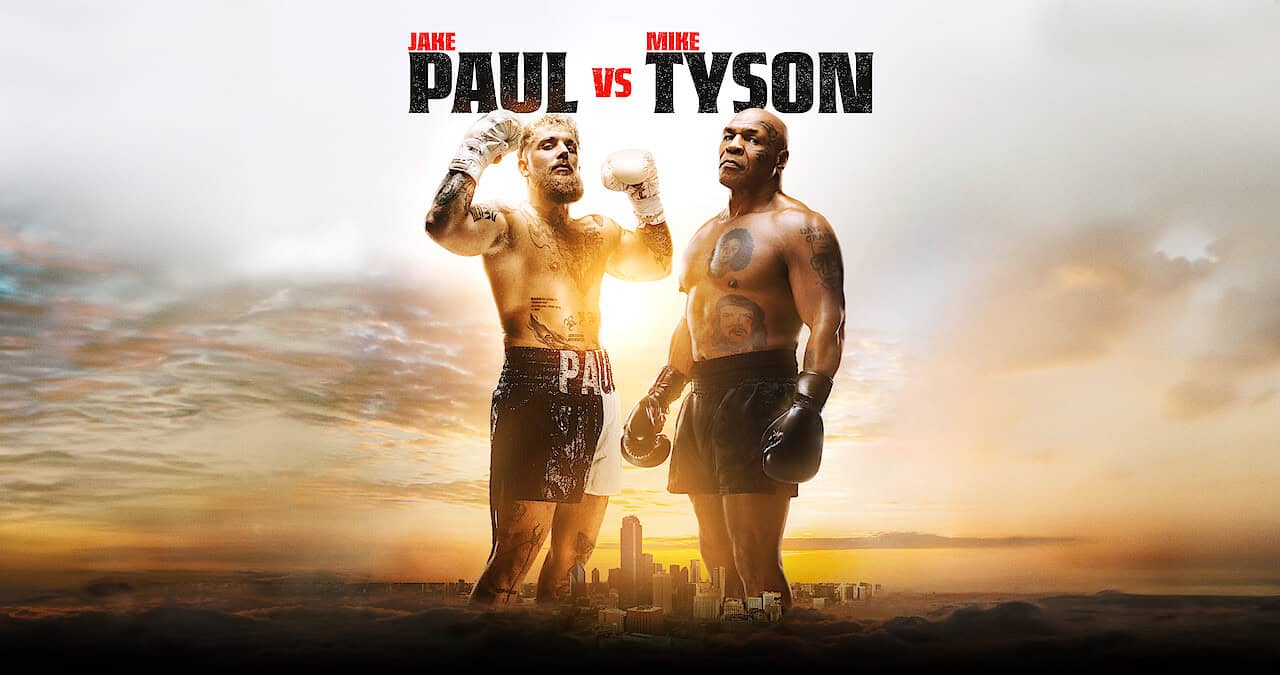The recent boxing match between Jake Paul and Mike Tyson, which aired on Netflix, attracted an impressive number of viewers. According to Netflix, 60 million households worldwide tuned in to watch the event live. This figure represents a significant milestone for both the streaming platform and the sport of boxing. During the main event, viewership peaked at 65 million concurrent streams, a level that competes with major traditional sports broadcasts.
This event highlights the increasing influence of streaming services in drawing large audiences for live sporting events. Netflix’s success with this boxing match could signal a shift in how people consume sports content. The platform’s ability to deliver such a high-profile event to a vast global audience may lead to more live sports offerings on streaming services in the future.
Tyson vs. Paul: Netflix Scores a Knockout with Record Streaming Viewership
A Surprising Success
The Jake Paul vs. Mike Tyson fight on Netflix was a big deal. More than 60 million households tuned in to watch. This is a huge number for a boxing match. It shows that people are still interested in seeing big names fight, even if they are not in their prime. The fight brought in a lot of new subscribers to Netflix. It also helped Netflix keep its current subscribers.
Why So Popular?
There are a few reasons why the fight was so popular. First, it had two very famous people. Mike Tyson is a boxing legend. Jake Paul is a popular YouTuber and social media star. Second, the fight was on Netflix. Netflix has a lot of subscribers. People could watch the fight from their homes. They did not have to pay extra for it. Third, the fight was promoted well. There were a lot of ads for it. People talked about it on social media.
A Look at the Numbers
The fight was a big success for Netflix. It was the most-watched boxing match in the company’s history. The fight also did well on social media. It was the top trending topic on Twitter.
It’s tricky to get completely accurate numbers for global sporting events, as different organizations have different ways of measuring viewership. But, based on available data and estimations, here’s a table showing some of the most-watched sporting events of all time, with the Tyson vs. Paul fight included for comparison:
| Rank | Event | Estimated Viewership | Notes |
|---|---|---|---|
| 1 | FIFA World Cup (2022) | 5 Billion+ | Held in Qatar, this was likely the most-watched sporting event in history. |
| 2 | Tour de France (Annual) | 3.5 Billion+ | Cumulative audience across the entire race. |
| 3 | Cricket World Cup (2019) | 2.6 Billion | India vs. New Zealand final drew a massive audience. |
| 4 | Summer Olympics (2020) | 2 Billion+ | Tokyo games, delayed to 2021 due to the pandemic. |
| 5 | Winter Olympics (2022) | 2 Billion+ | Beijing games, viewership impacted by various factors. |
| 6 | UEFA Champions League Final (Annual) | 380 Million+ | Europe’s premier club football competition. |
| 7 | Super Bowl (2023) | 115.1 Million | Most-watched Super Bowl in US history. |
| 8 | Tyson vs. Paul (2024) | 60 Million | Netflix event, significant for a boxing match on a streaming platform. |
It’s important to note a few things:
- Viewership Types: Some figures represent peak concurrent viewers, others are cumulative across a tournament.
- Data Collection: Methods vary, making direct comparisons difficult.
- Global vs. Regional: Some events have huge global appeal, others are more regionally focused.
Even with these caveats, it’s clear that the Tyson vs. Paul fight, while impressive for a streaming event, doesn’t quite reach the viewership of the biggest global sporting spectacles.
The Rise of Streaming and Sports
The Tyson vs. Paul fight highlights a growing trend: major sporting events finding homes on streaming platforms. This offers both challenges and opportunities:
- Challenges:
- Maintaining Streaming Quality: Handling massive concurrent viewership without technical issues.
- Piracy Concerns: Protecting content from illegal streaming.
- Building Hype: Replicating the “event feel” of traditional broadcasts.
- Opportunities:
- Reaching Wider Audiences: Accessibility for those without traditional TV subscriptions.
- New Revenue Models: Subscription fees, pay-per-view options, etc.
- Interactive Features: Integrating live chat, polls, and other engagement tools.
As streaming technology advances and consumer habits evolve, we can expect even more major sporting events to be streamed online, potentially blurring the lines between traditional broadcasting and digital platforms.
What is Next?
Netflix is likely to continue to show more boxing matches. The company has already signed a deal with Jake Paul. He will fight in more matches on Netflix. Netflix may also try to get other big names in boxing.
A New Era for Boxing?
The success of the Tyson vs. Paul fight could be good for boxing. It could bring new fans to the sport. It could also help to make boxing more popular. This could lead to more money in boxing. This could help to improve the sport.
The Future of Sports on Streaming Services
The Tyson vs. Paul fight is part of a trend. More and more sports are being shown on streaming services. This is because streaming services are becoming more popular. They are also becoming more affordable. Streaming services offer a lot of benefits. They are convenient. They are also easy to use. We can expect to see more sports on streaming services in the future. This is good news for fans. They will have more ways to watch their favorite sports.
| Feature | Traditional Pay-Per-View | Streaming Service |
|---|---|---|
| Cost | Often expensive (e.g., \$70-$100 per event) | Usually included in a monthly subscription fee |
| Convenience | May require special equipment or cable/satellite subscriptions | Accessible on various devices with internet connection |
| Accessibility | Limited to those willing to pay for individual events | Available to a wider audience with a subscription |
| Flexibility | No rewind or replay options typically | Often allows pausing, rewinding, and rewatching |
| Content Variety | Primarily focused on the live event | May include additional content like documentaries or pre-show analysis |
Key Takeaways
- Netflix’s boxing event reached 60 million households, setting a new streaming record
- The fight’s viewership demonstrates the growing appeal of live sports on streaming platforms
- This success may lead to more live sports offerings on streaming services in the future
Impact on Streaming Platforms and Audiences
The Tyson vs. Paul fight on Netflix marked a significant milestone for streaming platforms and combat sports audiences. It showcased the potential of live sports streaming and highlighted both technological challenges and social media engagement.
Streaming Challenges and Innovations
Netflix faced unprecedented demand during the Tyson vs. Paul fight. The platform peaked at 65 million concurrent streams, testing its buffering systems to the limit. Some viewers reported technical issues and freezing on Downdetector.
Netflix’s ability to handle this massive audience demonstrated significant advancements in streaming technology. The event pushed the boundaries of what’s possible for live sports distribution on streaming platforms.
Despite some hiccups, Netflix’s overall performance set a new standard for large-scale live event streaming. This success may encourage other streaming services to invest in similar high-profile live events.
Social Media and Public Engagement
The fight generated substantial buzz across social media platforms. Twitter, Instagram, and TikTok saw a flood of posts about the event, making it a top trending topic.
Fans shared reactions, memes, and highlights in real-time. This social conversation amplified interest in the fight and likely contributed to its record-breaking viewership.
The co-main event featuring Katie Taylor and Amanda Serrano also garnered significant attention. It may become the most-watched professional women’s sporting event in US history, highlighting growing interest in women’s combat sports.
Social media engagement extended the event’s impact beyond the fight itself. It created a shared experience for millions of viewers worldwide, demonstrating the power of combining live streaming with social platforms.
Cultural and Economic Impact of the Event
The boxing match between Jake Paul and Mike Tyson on Netflix shattered viewing records and set new benchmarks for combat sports. The event’s reach extended far beyond traditional boxing audiences, marking a significant shift in how major sporting events are consumed.
Promotional Success and Milestones
Netflix’s streaming of the Paul vs. Tyson fight drew 60 million households worldwide. The event peaked at 65 million concurrent streams, showcasing the platform’s ability to host large-scale live sports events. This viewership surpassed many traditional pay-per-view boxing matches.
The fight took place at Dallas Cowboys Stadium in Arlington, Texas. It set a new Texas gate record, highlighting the massive in-person appeal. Celebrities like Charlize Theron, Sugar Ray Leonard, and Shaquille O’Neal attended, adding to the event’s star power.
Athlete Profiles and Fight Outcomes
Jake Paul, the YouTuber-turned-boxer, faced off against Mike Tyson, the former heavyweight champion. Paul won by unanimous decision, cementing his status in the boxing world. The match demonstrated Paul’s growing skill and Tyson’s enduring appeal.
The co-main event featured Katie Taylor retaining her undisputed women’s lightweight title. This bout attracted 50 million viewers, potentially making it the most-watched professional women’s sporting event in U.S. history. The success of both fights underscores the growing popularity of boxing and combat sports on streaming platforms.
Frequently Asked Questions
The Tyson versus Paul boxing match on Netflix garnered substantial viewership and generated significant interest. The event raised questions about audience size, revenue, and implications for future streaming sports events.
What were the viewer statistics for the Tyson versus Paul boxing match?
The boxing match between Mike Tyson and Jake Paul attracted 60 million households worldwide. Netflix reported a peak of 65 million concurrent streams during the main event.
The co-main event featuring Serrano versus Taylor 2 drew nearly 50 million households globally.
What was the subscription fee for accessing the Tyson-Paul fight on Netflix?
Netflix did not charge an additional fee for the Tyson-Paul fight. The event was included in the standard Netflix subscription.
This approach differed from traditional pay-per-view boxing models, making the fight accessible to all Netflix subscribers.
How did the viewership numbers of the Tyson fight compare to other major broadcasting events?
The Tyson-Paul fight became one of the most-watched sporting events in history. Its 60 million household viewership surpassed many traditional television broadcasts.
The event likely set a record for the most-watched professional women’s sporting event in US history with the Serrano-Taylor 2 co-main event.
What revenue did the fight generate for both Mike Tyson and Jake Paul?
Specific revenue figures for Tyson and Paul have not been publicly disclosed. The fighters’ earnings likely included base purses and potential performance bonuses.
Netflix’s investment in the event suggests substantial payouts for the main participants.
What implications did the Tyson-Paul fight have for future boxing events on streaming platforms?
The success of the Tyson-Paul fight on Netflix may lead to more boxing events on streaming platforms. It demonstrated the viability of streaming as a medium for live sports.
This event could prompt other streaming services to invest in live boxing and combat sports programming.
How does the audience size for the Tyson fight reflect on the popularity of boxing as a spectator sport?
The massive viewership indicates strong public interest in boxing, especially high-profile matches. It suggests that boxing remains a popular spectator sport when promoted effectively.
The event’s success may lead to increased investment in boxing promotion and production across various platforms.







